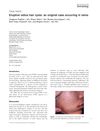
Understanding genetics is crucial for treating heart and skin diseases.
 January 2021 in “Acta Scientiae Veterinariae”
January 2021 in “Acta Scientiae Veterinariae” Levothyroxine effectively treated a dog's skin and hair problems caused by hypothyroidism.
 October 2020 in “Veterinary Dermatology”
October 2020 in “Veterinary Dermatology” New treatments and diagnostic methods for various animal skin conditions showed promising results.
[object Object]  June 2019 in “Pediatric Dermatology”
June 2019 in “Pediatric Dermatology” Alopecia in patients with epidermolysis bullosa varies in severity and is often caused by skin blistering or trauma.
 January 2019 in “Advances in stem cells and their niches”
January 2019 in “Advances in stem cells and their niches” Skin health and repair depend on the signals between skin stem cells and their surrounding cells.

Proretinal nanoparticles are a safe and effective way to deliver retinal to the skin.
 April 2016 in “The journal of investigative dermatology/Journal of investigative dermatology”
April 2016 in “The journal of investigative dermatology/Journal of investigative dermatology” RPGRIP1L helps skin cells stick together by blocking PKCβII, which can prevent skin blistering like in pemphigus.
 January 2014 in “Journal of Investigative Dermatology”
January 2014 in “Journal of Investigative Dermatology” Proteins like aPKC and PDGF-AA, substances like adenosine and ATP, and adipose-derived stem cells all play important roles in hair growth and health, and could potentially be used to treat hair loss and skin conditions.
 July 2011 in “British Journal of Dermatology”
July 2011 in “British Journal of Dermatology” Dermatologists give better information on pathology forms, hypersensitivity vasculitis is a common skin issue, misdiagnoses can occur, and various skin conditions are linked to loss of elastin or genetic factors.
 November 2009 in “Medical & surgical dermatology”
November 2009 in “Medical & surgical dermatology” The document concludes that Borrelia afzelii causes a skin condition in France, a gene is linked to hair loss in Caucasian women, and various genetic mutations affect skin diseases.
 July 2020 in “Bioinformatics and Bioengineering”
July 2020 in “Bioinformatics and Bioengineering” Found key genes affecting hair loss, immune response, and skin development; more research needed for better treatments.
 256 citations,
October 2013 in “Proceedings of the National Academy of Sciences of the United States of America”
256 citations,
October 2013 in “Proceedings of the National Academy of Sciences of the United States of America” Growing human skin cells in a 3D environment can stimulate new hair growth.
 211 citations,
April 2018 in “Cold Spring Harbor Perspectives in Biology”
211 citations,
April 2018 in “Cold Spring Harbor Perspectives in Biology” Keratins are crucial for cell structure, growth, and disease risk.
 146 citations,
January 2004 in “Hormones”
146 citations,
January 2004 in “Hormones” Human skin acts like a hormone-producing organ, making and managing various hormones important for skin and hair health.
 111 citations,
November 2007 in “Clinics in Dermatology”
111 citations,
November 2007 in “Clinics in Dermatology” Psoriasis skin changes are complex and might need several biopsies for a clear diagnosis.
50 citations,
May 2021 in “Frontiers in immunology” Certain immune cells contribute to skin autoimmune diseases, and some treatments can reverse hair loss in these conditions.
 40 citations,
July 2015 in “Journal of Cellular Biochemistry”
40 citations,
July 2015 in “Journal of Cellular Biochemistry” Cysteine helps maintain keratin production in skin cells even when iron is low.
 13 citations,
June 2018 in “Journal of histochemistry and cytochemistry/The journal of histochemistry and cytochemistry”
13 citations,
June 2018 in “Journal of histochemistry and cytochemistry/The journal of histochemistry and cytochemistry” Laminin-511 may contribute to psoriasis by affecting skin cell growth and survival.
 12 citations,
February 2008 in “Journal of The American Academy of Dermatology”
12 citations,
February 2008 in “Journal of The American Academy of Dermatology” Combining skin tissue pathology with genetics has greatly improved the diagnosis and understanding of certain skin diseases.
 10 citations,
September 2022 in “Advanced Healthcare Materials”
10 citations,
September 2022 in “Advanced Healthcare Materials” Current methods can't fully recreate skin and its features, and more research is needed for clinical use.
9 citations,
June 2023 in “Cells” Certain natural and synthetic compounds may help treat inflammatory skin diseases by targeting a specific signaling pathway.
 4 citations,
July 2014 in “International Journal of Dermatology”
4 citations,
July 2014 in “International Journal of Dermatology” Twins had rare skin cysts likely due to genetics.
1 citations,
March 2023 in “Pharmaceutics” PBMCsec can help reduce and improve thick skin scars.
 January 2024 in “Biomaterials Research”
January 2024 in “Biomaterials Research” 3D-cultured cells in HGC-coated environments improve hair growth and skin integration.
 April 2017 in “Journal of Investigative Dermatology”
April 2017 in “Journal of Investigative Dermatology” Scientists can control how skin stem cells divide by using different treatments.
 January 2008 in “Springer eBooks”
January 2008 in “Springer eBooks” Thyroid hormone may be useful for treating various skin conditions and needs more research.
 81 citations,
June 2012 in “European journal of human genetics”
81 citations,
June 2012 in “European journal of human genetics” Inherited ichthyoses cause widespread skin scaling and thickening due to gene mutations.
76 citations,
January 2010 in “Journal of bone and mineral metabolism” 50 citations,
April 2019 in “Journal of Biosciences” [object Object]  28 citations,
January 2013 in “Stem cells”
28 citations,
January 2013 in “Stem cells” Certain human skin cells marked by CD44 and ALDH are rich in stem cells capable of long-term skin renewal.

























